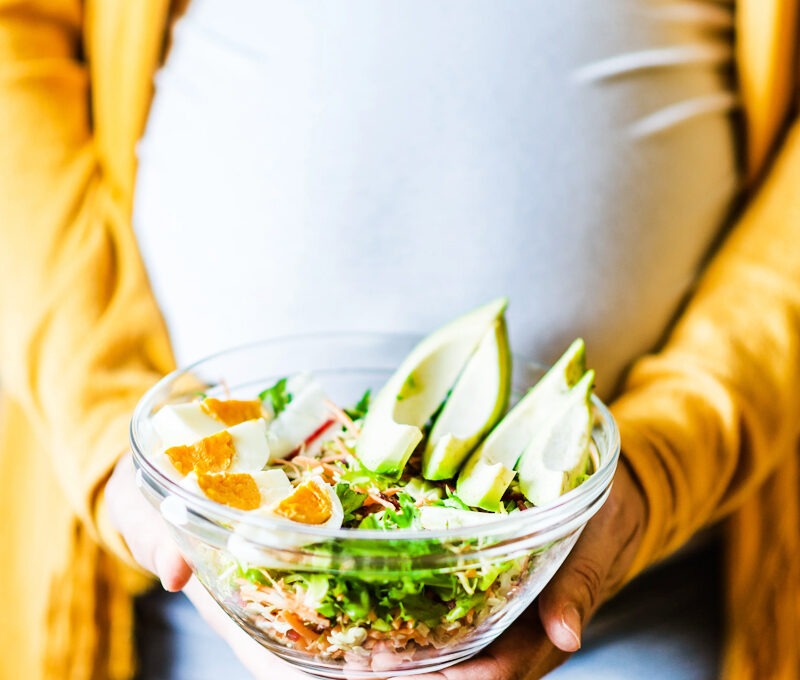As an expecting mother, you’re not just nurturing your own body but also providing the building blocks for your baby’s future health and development. One of the most important aspects of this journey is ensuring that your baby’s brain gets the right nutrients to grow strong and healthy.
What you eat has a big impact on your baby’s cognitive development! Just as you’re excitedly planning the nursery and thinking about baby names, planning your meals can be equally rewarding and crucial for your baby’s brain development. There are many foods that are packed with nutrients essential for building a smart and healthy brain.
In this post, we’ll dive into the world of brain-boosting foods that you can enjoy during pregnancy. We’ll explore how these delicious and nutritious choices can help support your baby’s cognitive growth, ensuring they get the best start in life.
Whether you’re a first-time mom or adding to your family, these tips and food ideas will help you nourish your baby’s developing mind.
Role Of Nutrition In Fetal Brain Development
Your baby’s brain starts developing long before birth. What you eats during your pregnancy plays a significant role in determining the future cognitive abilities of your baby.
One of the first organs to start developing in the womb is the brain. It requires a rich and steady supply of nutrients to grow properly and function efficiently.
This can be achieved through a balanced diet that aids with your child’s overall cognitive as well as physical development. However, there are certain foods that contain critical nutrients essential for optimal cognitive growth.
Essential Nutrients for Cognitive Development
The right nutrients act as building blocks for your fetus’ brain. Many times when a mother’s body is not providing the fetus with adequate nutrients, doctors recommend supplements. Whether that is because of an imbalanced diet or due to the body’s changes during pregnancy, supplements are a wonderful way to introduce specific nutrients to the body as well as the fetus.
Some of the more important and essential nutrients that play an important role in your baby’s fetal cognitive development are:
Omega-3 Fatty Acids
These essential fats are critical for the development of the brain and eyes. DHA (docosahexaenoic acid), a type of omega-3, is particularly important for the formation of the cerebral cortex, which is involved in memory, attention, and language.
Sources: Fatty fish like salmon, walnuts, and flaxseeds are excellent sources of omega-3s.
Folate (Vitamin B9)
Also known as folic acid or vitamin B9, folate is essential for the development of the neural tube, which becomes the baby’s brain and spinal cord. Adequate folic acid intake can prevent neural tube defects.
Sources: Leafy greens, oranges, and fortified grains are good sources of folic acid.
Choline
This nutrient is crucial for brain development and the formation of the hippocampus, a part of the brain associated with memory.
Sources: Choline is found in eggs, lean meats, and certain vegetables like broccoli.
Iodine
Iodine aids with the production of thyroid hormones, which are critical for brain development. Iodine deficiency can lead to intellectual disabilities and other developmental issues.
Sources: Iodized salt, dairy products, and fish are good sources of iodine.
Iron
Iron is vital for oxygen transport in the blood. During pregnancy, your body needs extra iron to support the increased blood volume and to provide oxygen to the baby. Iron deficiency can lead to impaired cognitive development in the fetus.
Sources: Spinach, red meat, and fortified cereals are rich in iron.
Protein
Proteins are the building blocks of life, and during pregnancy, they are crucial for the rapid growth and development of the baby’s brain. They help in forming the structure of brain cells and neurotransmitters, which are essential for communication between brain cells.
Sources: Lean meats, eggs, beans, and nuts are great sources of protein.
Zinc
Zinc plays a role in brain cell growth and function. It’s involved in synaptic transmission and neurogenesis, making it essential for the developing brain.
Sources: Meat, shellfish, and legumes are excellent sources of zinc.
Antioxidants (Vitamin C & E)
Antioxidants protect brain cells from damage by neutralizing free radicals. Vitamin C supports the formation of neurotransmitters and collagen, a protein important for brain structure. Vitamin E protects the brain’s fatty acids, which are crucial for brain cell integrity and function.
Sources: Vitamin C can be found in citrus fruits, berries, and bell peppers. Vitamin E is present in nuts, seeds, and green leafy vegetables.
Best Foods For Fetal Brain Development
While individual nutrients play specific roles, it’s the overall balance and variety in a diet that provide the best support for fetal brain development. A balanced diet ensures that all the necessary nutrients are available for the baby’s brain to develop optimally.
Certain foods are particularly beneficial for fetal brain development, providing essential nutrients that support cognitive functions and overall brain growth. Here are some top foods to include in your diet during pregnancy to help nurture your baby’s developing brain:
Some of the best foods to eat during pregnancy that aid your baby’s cognitive development are:
Fatty Fish
Fatty fish like salmon and sardines are rich in omega-3 fatty acids, particularly DHA (docosahexaenoic acid). DHA is a critical component of brain cell membranes and is essential for the development of the baby’s central nervous system.
How to Include It: Aim for at least two servings of fatty fish per week. You can enjoy grilled salmon or make sardine sandwiches. Don’t forget to choose low-mercury options like salmon and sardines and consult your healthcare provider for recommendations. Remember that the bigger and older a fish is, the higher its mercury level.
Eggs
Eggs are are rich in choline, a nutrient that supports the development of the fetal brain and spinal cord. They also provide high-quality protein and a variety of vitamins and minerals.
How to Include Them: Eggs are versatile and can be prepared in many ways—scrambled, boiled, poached, or baked. Adding them to breakfast burritos, salads, or simply enjoying them on their own are easy ways to add them to your diet.
Leafy Greens
Spinach, kale, and other leafy greens are packed with folic acid, a vital nutrient for preventing neural tube defects and supporting brain development. They are also rich in antioxidants like vitamins C and E, which protect the developing brain from oxidative stress.
How to Include Them: Incorporate leafy greens into your meals by adding them to smoothies, salads, or soups. You can also sauté them with garlic for a simple side dish or blend them into a pesto sauce for pasta.
Berries
Berries like blueberries, strawberries, and raspberries are high in antioxidants, particularly vitamin C. These antioxidants help protect the baby’s brain cells from damage and support the production of neurotransmitters.
How to Include Them: Berries make for an excellent snack. You can also add them to cereal or oatmeal, blend them into smoothies, or use them as a topping for desserts.
Whole Grains
Whole grains like oats, quinoa, and brown rice provide complex carbohydrates that supply a steady source of energy to the developing brain. They are also rich in fiber, iron, and B vitamins, which are crucial for overall brain function.
How to Include Them: Start your day with oatmeal or a quinoa breakfast bowl, use brown rice as a base for stir-fries, or add whole-grain bread to your meals.
Legumes
Beans, lentils, and chickpeas are excellent sources of protein, iron, and folic acid. These nutrients are fundamental for brain tissue growth and cognitive development.
How to Include Them: Add legumes to soups, stews, and salads, or enjoy them as a side dish. Hummus, made from chickpeas, is a tasty and nutritious dip or spread.
Avocados
Avocados are rich in healthy monounsaturated fats that support the development of the baby’s brain and nervous system. They also contain folate, vitamin E, and vitamin C, all essential for brain health.
How to Include Them: If you aren’t already on the avocado toast train or simply aren’t a fan, there are so many ways to incorporate them to your diet. Guacamole is an easy addition. You can also add it to salads or smoothies for a creamy addition.
Yogurt
Yogurt is a good source of protein, calcium, and iodine – especially Greek Yogurt. Iodine is essential for thyroid function, which in turn supports brain development. The probiotics in yogurt also promote gut health, which is increasingly linked to brain health.
How to Include It: Enjoy yogurt with fruit and granola for breakfast, use it as a base for smoothies, or include it in savory dishes like tzatziki or dressings.
Nuts & Seeds
Nuts and seeds, such as walnuts, flaxseeds, and chia seeds, are wonderful sources of omega-3 fatty acids, vitamin E, and zinc. These nutrients form the building blocks for brain cell formation, protection, and overall cognitive development.
How to Include Them: Snack on a handful of nuts, sprinkle seeds over yogurt or salads, or add them to smoothies. You can also use nut butters as a spread or ingredient in baked goods.
Lean Meats
Lean meats such as chicken, turkey, and beef provide high-quality protein and are rich in iron and zinc. Iron is crucial for delivering oxygen to the baby’s brain, and zinc supports brain cell growth and function.
How to Include Them: Incorporate lean meats into your meals by roasting, grilling, or adding them to stews and salads. Make sure to cook meats thoroughly to avoid any risk of foodborne illness.
By incorporating these nutrient-rich foods into your diet, you can provide optimal support for your baby’s brain development. Aim for a variety of colors, flavors, and textures to keep your meals interesting and nutritious.
Remember, a balanced and diverse diet not only supports fetal brain development but also keeps you healthy and energized throughout your pregnancy journey.
Listen to Your Body
Every pregnancy is unique, and it’s essential to listen to your body and consult with healthcare providers to tailor your diet to your specific needs. Whether it’s dealing with morning sickness, food aversions, or cravings, there are always nutritious choices that can fit your situation.
As you nourish yourself, you’re laying the foundation for your baby’s future learning, memory, and cognitive abilities. By understanding and embracing the role of nutrition in fetal brain development, you’re taking a powerful step towards giving your child the best possible start in life.
Consult with your healthcare provider or a nutritionist to tailor your diet to your specific needs and ensure you’re getting the right balance of nutrients. Your choices today lay the foundation for your baby’s cognitive health and future potential.










